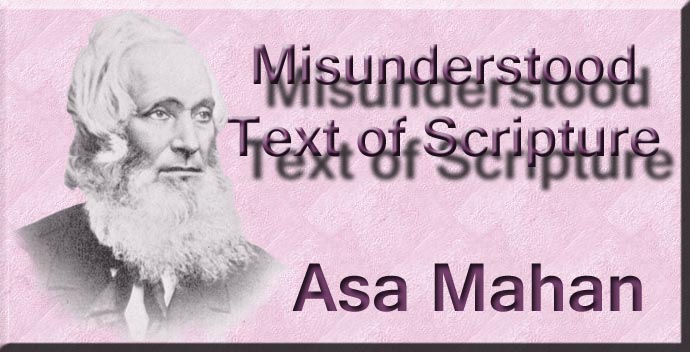
Misunderstood Text of Scripture
By Rev. Asa Mahan
Part I
Chapter 13
I KINGS VIII. 46.
THIS passage, as here rendered,. implies and affirms a universally admitted truth, namely, that all men are sinners. To infer anything more than this is to affirm, not only what the words do not imply, but what involves a palpable absurdity. Solomon refers to a contingency which was likely to occur in the future history of his people, namely, sin in a form which would involve them in the judgments of God. How natural, under such an impression, is the thought of the universal sinfulness of the race, of the fact that all men are sinners. To suppose that under such circumstances his thoughts would not turn in this direction, but would run forward to the end of time, that none but saints and believers in Jesus would come before his mind, and but this one thought in regard to them, viz., that not one of them would, at any period of their lives, attain to freedom from conscious sin,---to suppose that this was the dogma that then came before his mind, is one of the most palpable absurdities that ever danced in the brain of a theologian. There is nothing in the circumstances to suggest such an idea, and nothing, we repeat, in the language employed that implies it. The following note from the comprehensive Bible shows clearly that still another rendering should be given to the original of this passage:--- "The second clause of this verse, as it is here translated, renders this supposition, in the first clause, entirely nugatory, for if there be no man that sinneth not, it is useless to say, if they sin; but this contradiction is removed by rendering the original, 'If they shall sin against Thee (for there is no man that may not sin),' i.e., there is no man impeccable, or infallible---none that is not liable to sin." This rendering, which, as Dr. Clarke shows, is demanded by the conjugation in which the word translated sin is found, makes the whole passage self-consistent, and fraught with important meaning. This unquestionably gives us the true meaning of the author of this utterance. In no case, however, can this passage be legitimately made to sustain or favour the dogma of the continued conscious sinfulness of all believers. |
|
 |
 |
|
|
|
-
Site Navigation
 Home
Home What's New
What's New Bible
Bible Photos
Photos Hiking
Hiking E-Books
E-Books Genealogy
Genealogy Profile
Free Plug-ins You May Need
Profile
Free Plug-ins You May Need
 Get Java
Get Java.png) Get Flash
Get Flash Get 7-Zip
Get 7-Zip Get Acrobat Reader
Get Acrobat Reader Get TheWORD
Get TheWORD